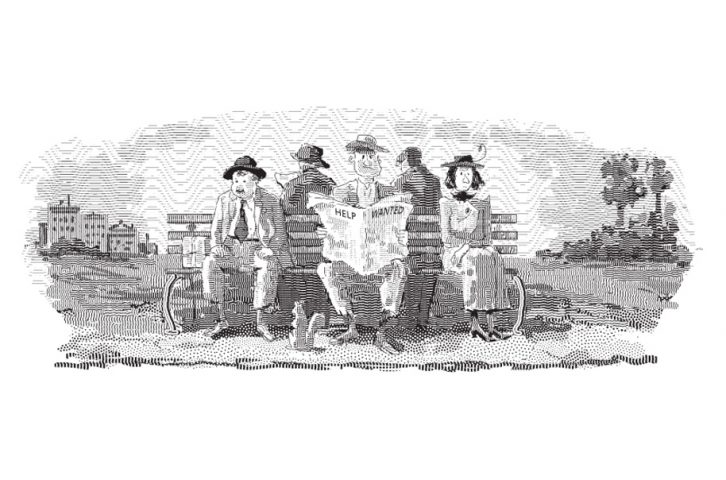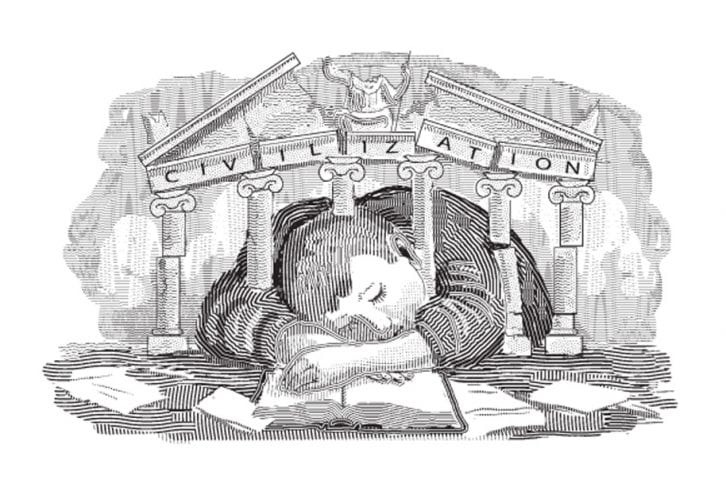Books Reviewed
Catherine Zuckert's Plato's Philosophers aims to be a comprehensive account of Plato's 35 dialogues. At nearly 900 dense pages, it is more easily carried on a Kindle than in a knapsack. It is a credit to the University of Chicago to have published such a big book at such a fair price. At a nickel a page, it delivers the value that the newly frugal American consumer demands, were he demanding books on Plato.
He is, of course, not demanding books on Plato. Philosophy today is largely a specialist's discipline. It has lost the general academic, cultural, and occasional political importance it had, say, in Germany from Kant through Heidegger or during John Dewey's generation in the United States. Yet it has managed to ensconce itself, for now, in an academic establishment that continues to produce a frightening number of Ph.D.s who teach a staggering number of students. One consequence of the resulting specialization is an explosion of scholarship, harmful because it makes philosophy narrow and petty, yet helpful because one can occasionally learn something from it. Many more books now exist on specific Platonic dialogues than once did, and scholars write articles galore on this or that aspect of a dialogue, or argument in it. Zuckert's book makes good use of others' efforts, while standing as an implicit rebuke to their narrowness, or laziness.
Zuckert, the Nancy Reeves Dreux Professor of Political Science at the University of Notre Dame, organizes her new book around two principles. One is to discuss the dialogues in the order of their so-called dramatic dates, the times when we think they take place. Each dialogue poses a problem that Socrates must face, or teaches him something he should learn. The Platonic corpus becomes, in effect, Socrates' Bildungsroman. The other principle is to contrast the many conversations in which Socrates is Plato's chief character with those few in which he is not.
It is not hard to criticize these schemes, especially the first, and I will do so forthwith with what doubtless will strike the author as the usual unfairness of the smug reviewer. The heart of her book is less these devices, however, than her summaries and analyses of the dialogues, and here, especially, she has much worthwhile to say. No serious student of Plato could fail to benefit from her careful, intelligent, probing, and illuminating discussions.
* * *
There are two chief difficulties with organizing the presentation by dramatic date. One is that the times when several dialogues are performed are speculative: Plato sometimes gives us no evidence, so we must search outside him to find whatever we can. This violates Zuckert's usual, and wise, interpretive practice of not going beyond what a dialogue indicates to explain anything in it. A related issue is that some dialogues could not have taken place at any time, given the presence of anachronisms, or the fact that their characters are too old, young, or geographically ambiguous to be talking together when they are supposed to be conversing. Dating the dramas of the Republic, Phaedrus, Protagoras,Symposium, Hipparchus, Lovers, Minos, Philebus, and Menexenus, among others, suffers from one or another of these problems.
The second difficulty is that there are other ways to organize the dialogues, ways based on factors Plato makes explicit. The obvious one is to distinguish between dialogues that are performed, as a play is performed, and those narrated, as, say, Socrates narrates the Republic. Another is to organize by the appearance, or mention, of similar characters, the group in the Protagoras and Symposium, for example, or those where Gorgias is mentioned or appears. A third is to follow the places where Plato clearly indicates some dialogues' chronological order, e.g., those that are explicitly said to occur around the time of Socrates' trial.
Zuckert's method is most successful when it overlaps an order that Plato himself makes evident, as in the case just mentioned, or in her choice to discuss the explicitly early Parmenides near the start of her book, despite its difficulty. Her practice is least successful when it draws attention away from substantive questions, as in her scattering of dialogues that discuss virtue, such as the Protagoras and Gorgias. She herself at times claims that her procedure merely indicates the "order and connections among the dialogues." One might conclude that her method is one way to proceed, but not the only, or, even, the best way.
* * *
One place where Zuckert's procedure yields a surprising result is her decision to make the Laws the first dialogue that she discusses, although it is likely the last one that Plato wrote. She argues that it is dramatically early because it refers only to events that occurred before the Peloponnesian War. The Athenian Stranger could not be Socrates, therefore, contrary to what Aristotle indicates.
The importance Zuckert attributes to the Parmenides and Laws fits her second organizing principle. Here, she is on firmer ground, from which most scholars flee. Plato uses several chief interlocutors—Socrates, usually, but also the Athenian Stranger, the Eleatic Stranger, Parmenides, and Timaeus. Why is Socrates not always the chief speaker? Presumably, Plato did not choose randomly.
It is easy to see why a conversation that includes Socrates as a young man might be led by someone else, such as Parmenides, or why Plato chose not to use Socrates to make a speech as long as that at the heart of the Timaeus. It would have been difficult, too, for Plato to concoct a situation (say, during war) in which the otherwise non-traveling Socrates could have held the political discussion the Athenian held with a Cretan and Spartan. Zuckert's method, however, leads her to overstate the substantive differences that such divergence among chief interlocutors might suggest. In which cases, if one did not know in advance that Plato had used a main interlocutor other than Socrates, would one have predicted that the core of the dialogue would demand it? Does the Laws, for example, contain anything substantial that Socrates did not or could not have argued?
The issue is gravest with the Sophist and Statesman, dialogues that are led by the Eleatic Stranger, not Socrates. In order to contrast Socrates clearly with the Eleatic, Zuckert tends to exaggerate the erotic aspect of Socrates' thought. She makes Socrates so concerned to claim ignorance that she downplays excessively the affirmative statements that he makes or, indeed, affirmative conclusions that he reaches, about justice, rhetoric, the order of the soul, pleasure, and other matters in dialogues such as the Republic, Gorgias, and Philebus. Likewise, she understates the importance of Socrates' several indications of the characteristics of ideas; his suggestions about flat unities (such as mud and quickness), not only hierarchical ones; and his elaboration of the importance of measure. These indications often bring him closer to the author's picture of the Eleatic Stranger than to her portrait of Socrates.
Indeed, one can show similar closeness starting from the Eleatic—in his indications in the Statesman about composition and wholes, in the agreement between his view of politics and Socrates' (and the Athenian Stranger's), and in his discussion of images. Zuckert has the Stranger "implicitly" warning or scolding Socrates about dangers in the relation between philosophy and the city that, in fact, Socrates already knows. There are indeed differences between Socrates and the Eleatic, but Zuckert sometimes overemphasizes initial distinctions as if they were conclusive.
Another way to say this is that in her effort to trace Socrates' arguments temporally and to discuss the differences among his chief interlocutors, Plato himself sometimes gets lost. After all, the Athenian and Eleatic Strangers and Timaeus are merely Platonic characters. Zuckert occasionally treats them as if they are living and breathing. Even the difference between the dialogic and historical Socrates can become clouded. I wonder if it is not best to remember that all the dialogues stem from Plato, and to attempt to find the substantive unity from which he presents different chief interlocutors and, indeed, makes Socrates himself say different things in different dialogues about the same subjects. Such difference within unity can stem from the complexity of the questions that Plato considers; unity need not mean identity.
* * *
A comprehensive approach such as Zuckert's should yield certain advantages that a book centered on one or two dialogues does not. One ought to be able to compare substantive discussions across dialogues, so that one might examine Plato's or Socrates' overall view on courage, virtue generally, rhetoric, images, varieties of relationship among whole and part, and the like. Oddly, Zuckert does very little of this, even though she indicates the importance of the issue of the unity of virtue by highlighting, through its appearance at the end of the Laws, its significance for Socrates' subsequent discussions. Moreover, despite the fact that she makes Socrates' openness, eroticism, or stance between the sensible and the intelligible such a central issue, she does not explore the opportunities to understand the nature of Socratic questioning that are afforded by what Plato indicates throughout the dialogues about search, perplexity, and wonder.
She concentrates, instead, on the dialogues one by one, and knits them together primarily in terms of her two themes. Each of her discussions is worth pondering; it is obviously beyond my task here to summarize them. Among the dialogues that she analyzes with greatest insight are the Phaedrus, Phaedo, Timaeus, and Parmenides. Her discussion of theCratylus is especially useful. Whatever one's disagreements with Catherine Zuckert's methods or arguments, she has written an important, impressive, and, one hopes, lasting book.




